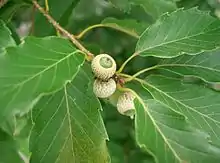Quercus serrata
Quercus serrata, the jolcham oak,[3] (Chinese: 枹栎; pinyin: bāolì, 小楢 (Japanese: konara)[4] is an East Asian species of tree in the beech family. It is native to China, Taiwan, Japan, and Korea.[5][6]
| Quercus serrata | |
|---|---|
 | |
| Scientific classification | |
| Kingdom: | Plantae |
| Clade: | Tracheophytes |
| Clade: | Angiosperms |
| Clade: | Eudicots |
| Clade: | Rosids |
| Order: | Fagales |
| Family: | Fagaceae |
| Genus: | Quercus |
| Subgenus: | Quercus subg. Quercus |
| Section: | Quercus sect. Quercus |
| Species: | Q. serrata |
| Binomial name | |
| Quercus serrata | |
| Synonyms[2] | |
|
List
| |
Description
Quercus serrata is a deciduous oak tree reaching a height of 25 metres (82 ft) occupying elevations from 100–2,000 metres (330–6,560 ft). Leaves are up to 17 centimetres (6.7 in) long by 9 centimetres (3.5 in) wide, leathery, elliptical in shape, with serrated margins. Leaves are densely covered with trichomes when young becoming glabrous with age. Petioles are short (3 cm). Flowers are pistillate inflorescences from 1.5–3 centimetres (0.59–1.18 in) long occurring in March to April. Seeds are oval shaped acorns 1.7–2 centimetres (0.67–0.79 in) long and take 1 year to mature. A cup with trichomes and triangular shaped scales covers 1/4 to 1/3 of the acorn. Bark is grey or reddish-brown with longitudinal furrows.[5]
The plant frequently attracts stinkbugs who lay their eggs inside them.[7]
References
- "Quercus serrata Murray". Tropicos. Missouri Botanical Garden. Retrieved 2018-08-17.
- "Quercus serrata subsp. serrata". World Checklist of Selected Plant Families (WCSP). Royal Botanic Gardens, Kew – via The Plant List.
- Lee, Sangtae; Chang, Kae Sun, eds. (2015). English Names for Korean Native Plants (PDF). Pocheon: Korea National Arboretum. p. 600. ISBN 978-89-97450-98-5. Retrieved 12 March 2019 – via Korea Forest Service.
- Makino Tomitaro. 2016. Makino Nihon Shokubutsu Zuroku. Student edition. Tokyo: Hokuryukan.
- Huang, Chengjiu; Zhang, Yongtian; Bartholomew, Bruce. "Quercus serrata". Flora of China. 4 – via eFloras.org, Missouri Botanical Garden, St. Louis, MO & Harvard University Herbaria, Cambridge, MA.
- International Oak Society - Report from the Oak ICRA checklist (Quercus serrata)
- "Biological roles of symbiont-supplemented egg-covering jelly of urostylidid stinkbugs". Phys.org. 2014-11-05. Retrieved 2017-04-04.
